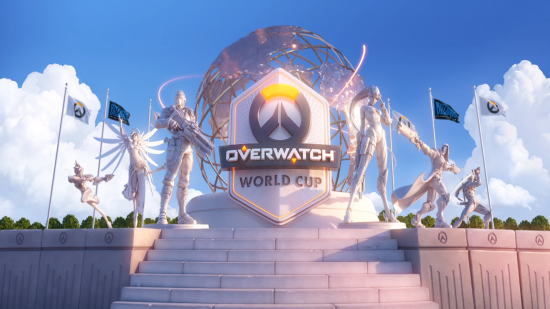Last year, the Overwatch World Cup felt like a precursor to the world of Overwatch esports. In many ways it was, giving us all a chance to imagine what the Overwatch League (OWL) would look like when it kicked off later that year, and how it would perform. But this year’s Overwatch World Cup is different. No clearer were the changes than at the Paris group stage.
One of the new and upcoming OWL teams is owned by DM Esports, and is to be based in Paris. That makes the final World Cup group stage’s audience the home crowd for the new Paris OWL team. As such, the enthusiasm for the competition from the arena can be taken as a positive sign for the new Paris team – a warm up before the sprint.
Speaking to some of the players in Paris, it’s clear that a key motivator for taking part in the Overwatch World Cup is the chance to be spotted by an OWL team. ChrisTFer, one of the UK team’s players, described the Overwatch World Cup as “effectively a stepping stone, a way to get there,” whereas CrusaDe from the Netherlands team said it’s “such a good place, even for unknown players, to showcase talent, because not every country is as popular.”
CrusaDe makes an important point. The Overwatch World Cup is a chance for players who don’t come from regions where major esports organisations are setup to showcase their talent. This is crucial for the health of the scene the world over. Giving aspiring players more opportunities to prove their skill only means the competition will improve. ChrisTFer remembered fondly how Klaus, a member of Team Argentina in 2017, turned heads as he unexpectedly popped off during last year’s Overwatch World Cup.
“I’m sure he gets trials based off it,” he tells me, “whereas regardless of how good he plays in South American Contenders, there isn’t enough eyes [on him]. So for [people from] countries like that, the World Cup is the most significant thing by far.”
.@SoOn99 says LET THEM EAT HEAD SHOTS! 🇫🇷
#OWWC2018 @avecle6 pic.twitter.com/S4fQr36WJz— Overwatch Path to Pro (@owpathtopro) September 23, 2018
Even for those players who are already in Overwatch Contenders, it’s another chance to prove themselves. Especially as there are going be 20 OWL teams next season. That’s 120 players for the main rosters, not including subs, coaches, possibly even internal scrim teams. As the number increases, as the fan bases develop, there are more and more opportunities for aspiring OWL players to slot themselves in.
The casters at the Paris group stage pointed out that Vizility – a player for the Netherlands team and, previously, Toronto Esports – is going to have a lot of scouts watching him in the break between OWL seasons. Likewise, Poland’s Danye, Germany’s KodaK, and Italy’s DragonEddy are all players that many fans will never have heard of before, but who got multiple callouts from casters and thorough analysis for their performances at the group stage. For the rest of the year, they’ll be riding the high, and will hopefully go on to try out for the major OWL teams.
For players, the Overwatch World Cup is considered by many to be a place for talent to be scouted for the Overwatch League, then. That may never change – it could always be a stepping stone to bigger places, nothing more. But if that’s to be the case, then the organisers of the World Cup would do well to recognise what the tournament is already great at: being a friendly space for global teams to come together once a year and compete without the pressure that OWL brings.
Indeed, ChrisTFer compares the whole event to being on holiday with all his friends. Team Italy’s Midna described the opportunity to play in front of a big crowd – which is otherwise a privilege for OWL players alone – as being something only this tournament offers for him, giving him a place to shine.“You can be the player you are, and you can show people what you’re made of,” he tells me.
That’s what the end goal of the Overwatch World Cup should be: to create a stage for the best in every nation to prove themselves, to fans, to scouts, and to themselves. In its current state, it’s a good start, but there’s a lot of work to be done. Despite being the World Cup, there are only 24 national committees involved this year, none of which are based in Africa. The selection process for this year was based on the country’s skill ranking through April 2018. This automatically makes it harder for a number of countries to even be considered, as the most popular and, crucially, sellable regions get the majority of resources.
The list of qualified teams this year surprised nobody. South Korea, USA, Canada, Australia, and China all qualified last year alongside Paris group stage winners France and the UK. Finland was the only new team to qualify this year. Hopefully, next year, we’ll see a wider geography represented in the qualifying teams, giving a chance to those players who don’t have access to the opportunities in North America, Asia, and Western Europe.
Esports is often criticised for being a one-team show whenever South Korea is involved. The nation has a lot of esports talent, but it also gives its players a lot of support through organisers and fans, the likes of which needs to spread to every other region. Until that happens we won’t really see the change that Overwatch esports needs to grow into the global phenomenon that many want it to be.
